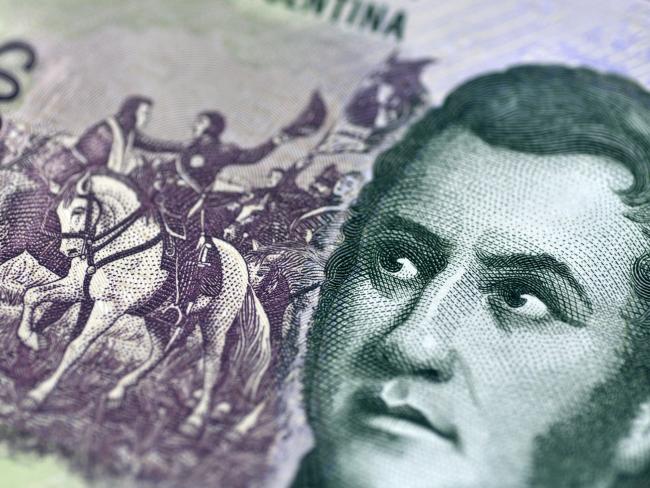(Bloomberg) -- The Argentine peso resumed its slide to a historic low as a major shakeup that put a former Wall Street trader at the helm of the nation’s central bank failed to curb the currency’s massive volatility.
Investors initially cheered the fact that Luis Caputo, who held roles at JPMorgan Chase & Co (NYSE:JPM). and Deutsche Bank (DE:DBKGn), will take over the post following Federico Sturzenegger’s surprise resignation. All that enthusiasm sent the peso up more than 4 percent in the first hour of trading Friday, before a reality check kicked in -- sinking the currency to an all-time low. The yield on Argentina’s 100-year bond jumped to a record 9 percent.
Traders have been desperate for policy makers to lay out a strategy to curb the peso volatility, complaining that all they got in response was disjointed and unpredictable policy. Investors had expected that a $50 billion deal with the International Monetary Fund last week would return calm to the market. Instead, the peso collapse has added to the woes of a country already under siege from double-digit inflation and a ballooning current-account deficit.
The policy outlook for the Argentine peso remains challenging and the shakeup in central bank leadership doesn’t change that, said Erik Nelson, a currency strategist at Wells Fargo (NYSE:WFC) in New York. “We would still expect Argentine peso weakness over time, but the question for us is how significant that weakness will be and whether the currency can eventually stabilize or recover," he said.
The peso dropped 1.4 percent to 28.10 per dollar Friday, leading losses among the world’s major currencies. The Merval gauge of stocks extended a four-day slide.
In May, officials sought to arrest the peso decline by jacking up interest rates to the highest in the world at 40 percent, intervening directly in the market and using a $5 billion offer at 25 pesos per dollar to contain the currency while the government negotiated the deal with the IMF. The day of the announcement, Sturzenegger said that the bank would only intervene in the market in "disruptive situations." Still, the central bank spent $794 million over two days to curb losses as volume plummeted.
The changes at the helm of the central bank, which included the departure of several high ranking officers, capped a dramatic day in local markets Thursday, with the peso plummeting and the monetary authority refraining from an intervention.
It’s "rushed and sloppy" to change the president of the central bank who signed an agreement with the IMF that hasn’t even started, according to a note by Perspectiv@s Economicas, a research firm led by Luis Secco, former cabinet chief at state-run Banco de la Nacion.
"In the next few days, we will know what the market reaction is and to what extent the problem was due to management by the central bank’s trading desk or if it’s a deeper problem that goes beyond individuals," the note said.
Caputo took the helm of the Finance Ministry in December 2016 after serving as a key figure in securing an agreement with investors holding debt the country defaulted on in 2001, a truce that allowed the country to return to global capital markets.
“The one person on Macri’s team they have confidence in is Toto Caputo,” said Walter Stoeppelwerth, the chief investment officer at Balanz Capital Valores in Buenos Aires. “Toto is a trader by nature. He’s going to have a clear trading plan. He’s somebody the market knows, in New York, in Buenos Aires... He’s somebody that people trust to make the right decisions, and who’s going to be decisive."
Here’s what traders and analysts are saying:
- Delphine Arrighi, portfolio manager at Old Mutual Global Investors in London:
- The appointment of Caputo doesn’t change the medium-term challenges
- "At the end of the day, the BCRA will still have to find the right balance between letting the FX adjusting to a market equilibrium, while intervening just enough to avoid another wave of panic selling from the locals"
- Ilya Gofshteyn, an analyst at Standard Chartered (LON:STAN) in New York:
- The resignation of Sturzenegger isn’t "meaningfully positive"
- "A change was needed at the top as a matter following norms and because BCRA credibility had been eroded so badly"
- "He was perceived as having failed at his job. But this is no way makes the BCRA’s job easier"
- The peso weakness has been function of fundamental vulnerabilities in Argentina and difficult EM environment -- “Neither has changed overnight"
- Italo Lombardi, economist for Latin America at Credit Agricole (PA:CAGR) in New York:
- "The situation in Argentina is not going to be solved overnight, but markets will continue to adjust"
- "It is more likely that the currency will stabilize at 28, 29, even 30 now than it was at the beginning of the week at 25"
- Gustavo Rangel, chief economist for Latin America at ING Financial Markets LLC in New York
- “This should work better now, but the market has been so anxious and much of the success of the new team depends on credibility and preventing a perception that authorities lack a strategy to effectively re-anchor FX dynamics"
- Mohamed El-Erian, chief economic adviser to Allianz (DE:ALVG) SE and a Bloomberg Opinion contributor, writes on Twitter:
- Stabilization in peso is important to avoid contaminating Argentine growth prospects or undermining IMF program
